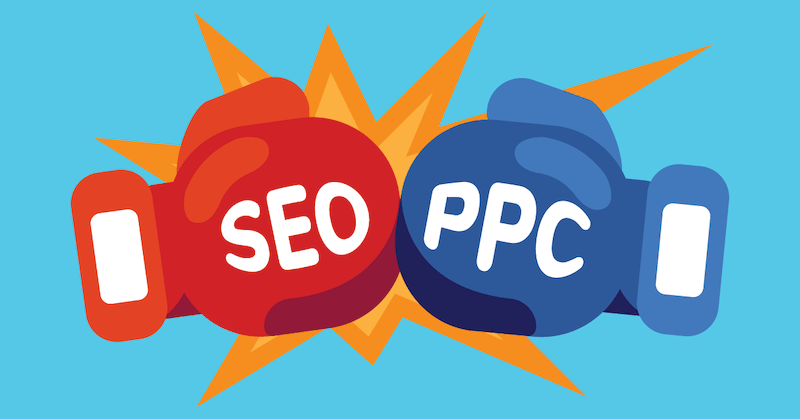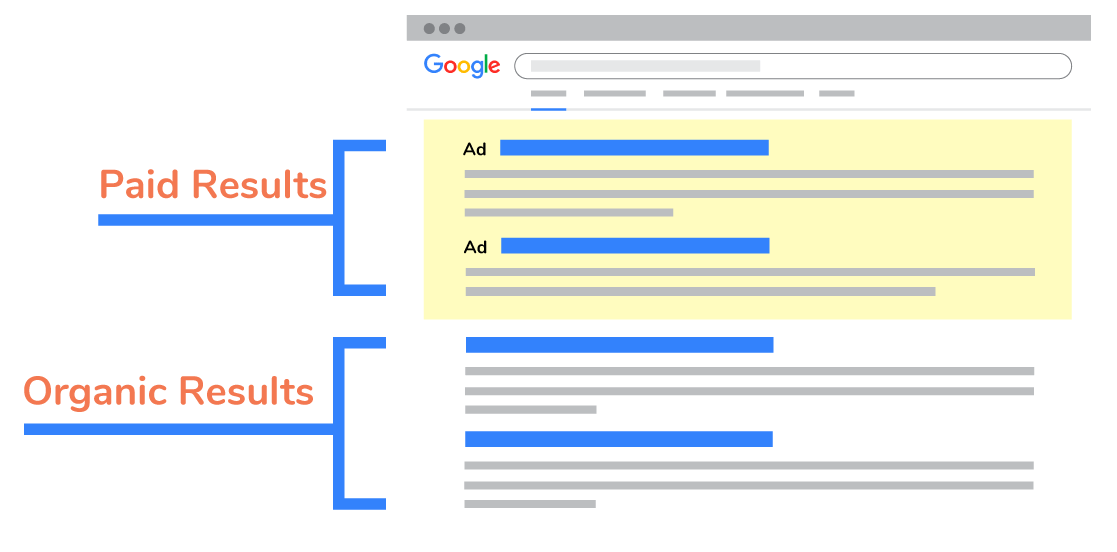The difference between SEO and Paid Search

Why SEO and Paid Search matter
We get asked almost daily: what’s the difference between Search Engine Optimization (SEO) and Paid Search (PPC)? Both are forms of Search Engine Marketing (SEM), but each has a separate focus. 93% of online experiences start with a search, and you want your business to show up one way or another in the results. SEO and PPC both fit the bill, but in different ways. In this article, we’ll cover what SEO and PPC are, the differences between them, and why they work well together.
What is SEO?
Search Engine Optimization (SEO) focuses on optimizing your website to get traffic from organic search results, the end goal being higher rankings on the Search Engine Results Pages (SERPS). SEO deals only with non-paid results and can be broken down into a few categories:
- On-page SEO is the practice of optimizing your website around keywords that your target audience searches for. This includes elements like page titles, headline tags, meta descriptions, and the page URL. Content is king for on-page SEO. Blog articles, infographics, podcasts, videos, and more all contribute to the SEO of your site, if they focus on the right keywords for that piece of content.
- Off-page SEO focuses on building trust and authority for your site. Most often this involves high-quality backlinks to your website. There are other factors at play, such as social sharing and E-A-T ranking. E-A-T refers to expertise, authority, and trustworthiness as it relates to individual web pages. The scope of E-A-T is beyond this article – just know that it comes down to your content being valuable and helpful.
- Technical SEO makes sure that search engines can crawl and index all the pages of your website. It also gets into page speed load times and that your site is architected properly.
- User Interaction Signals help search engines look at how users interact with your site. High bounce rates or low time on a page can show that your page isn’t a good fit for the keyword and can affect your ranking.
Pros and Cons of SEO
Pros
- Less maintenance than Paid Search
- Generates long-term consistent traffic
- Increases organic exposure on SERPS
- Long-term ROI
- Builds authority, makes you the expert
Cons
- Results take time, not good for immediate results
- Your ROI is at the whim of Google’s algorithm changes
- Analytics is not as precise as Paid Search
- Less control over performance
What is Paid Search (PPC)?
Paid Search (PPC) is the process of buying ads to improve the visibility of your website on search engines. The end goal is that your ads appear at the top of the SERP for the keywords you target. Typically, you’ll be charged each time someone clicks on an ad (cost-per-click).
Businesses bid on certain keywords they want their ads to show up for. The search engine performs an auction amongst those businesses that have bid on the keyword as it is searched for. The highest paying bidders show up first.
While it’s quite simple to fire up a paid search campaign, be warned: jumping in without proper planning and forethought can eat up your ad spend in a hurry. In almost all cases, it’s worth the investment to have an agency or expert set up and manage your campaigns.
Pros and Cons of Paid Search (PPC)
Pros
- Immediate results, great for time-sensitive offers
- Works while you are in market
- Less affected by algorithm changes
- Attracts and persuades
- Hyper-focused audience targeting
- Detailed analytics
- Excellent short-term ROI
Cons
- Requires ongoing care and optimization
- Expertise required
- High risk if approached DIY
- Can be expensive if ROI isn’t monitored
The difference between SEO and PPC
Search Engine Results Page Placement
The most noticeable difference between SEO and Paid Search is where the results appear on the Search Engine Results Page (SERP). The top four paid search results appear right at the top of the SERP, followed then by the top ten organic (SEO) results. The end of the page has another selection of paid search results. The first and last thing people see on SERPS is Paid Search.

SERP Real Estate
If you zoom out on a SERP, you’d see that most of the page is organic results. This is, after all, a search engine’s main job–to deliver relevant search results. Organic results can include FAQ results, shopping results, map results, extensions, and more. That means SEO efforts can take up to 80% of the SERP with lots of engaging content. That extra engaging content oftentimes comes from your Google My Business profile. Having that profile optimized is key to cashing in on some of these advanced features.
Cost
SEO is typically performed for a given amount of time on a retainer or monthly fee. You’ll have a set cost that can sometimes be adjusted up and down as needed. You need to optimize your site regularly and make major adjustments at times when Google or another engine changes its algorithms. So long as you engage an agency to do the optimization or other services like content creation, you’ll continue to have a fee.
PPC involves purchasing media. That budget can be small or large depending on your goals. An agency will normally have a set of fees or charge you a percentage based on your actual spending. PPC costs go up and down as the market changes and keywords become more or less competitive. PPC profit margins tend to be lower than SEO long-term. This is because you are getting immediate results and paying to appear at the top of SERPs.
Lifespan
The lifespan of SEO work when done properly can go on for several years, perhaps even more. When you create content to rank your site in search and drive traffic, you no longer need to spend money for your audience to see it. A click on organic results has zero cost. But before you think SEO is set it and forget it, think again. As mentioned before, there is optimization to continue to rank your content, along with creating new content on a regular basis.
The lifespan of a PPC campaign lasts only as long as you continue to buy media. While SEO can take months or years to see results, with PPC campaigns you can see results in as little as a few hours. Once you stop spending, the campaign ends and you’ll need to reboot the campaign again to see results.
Targeting
PPC allows laser-focused targeting of your audience. When a PPC campaign is set up you’ll choose who you want to target with your ads. Are you interested in only a certain geographic area? People with particular interests? Specific age groups? PPC can do that.
SEO does not allow for audience targeting. To get around this, a good agency can build an SEO plan that attracts people interested in certain subjects. What SEO cannot do is focus on an audience through targeting.
So, what should I use, SEO or PPC?
Many marketers pit SEO against PPC. Knowing the difference between SEO and Paid Search helps you understand that each has a unique role to fill in your marketing plan. Think of the results of SEO vs the results of PPC like providing food for your family. You can plant a garden (SEO) or go to the grocery store (PPC). Most people don’t do one or the other, they use a combination to put food on the table. An integrated combination of SEO and PPC, as well as other paid media, can work together to deliver results today and into the future. Here are just a few ideas of how that might work.
-
Retarget website visitors with PPC
- For visitors who visit your site but don’t buy, you can retarget them with PPC ads to encourage them to come back and make that purchase. This works incredibly well if you have an SEO strategy that is driving organic traffic to your site.
-
Promote your content
- The goal of SEO is to drive organic traffic, but it never hurts to give it a little push. Using PPC and other paid media, you can promote your website content to gain market traction and exposure. While your content will eventually get found by Google, an effective content distribution plan will help speed up the process. It also helps in getting those all-important backlinks.
-
Generate content ideas from PPC stats
- Generating content can be one of the most challenging aspects of SEO. PPC campaign data is a treasure trove of keywords, competitive insights, and the best calls to action. Leverage this data to help identify content ideas that move the needle.
How can we help?
In this article, you learned the difference between SEO and Paid Search. We explored the pros and cons of each practice and how the two can work together to improve the search exposure of your business. At MPP, we’re standing by to answer your questions about SEO, Paid Search, and other forms of media. Contact us today and let’s improve your marketing.


